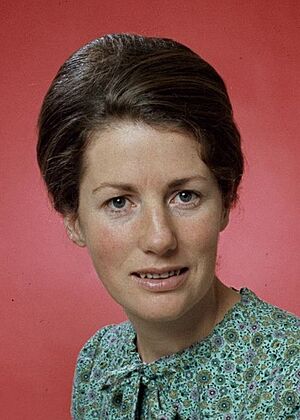Elizabeth Anne Reid facts for kids
Quick facts for kids
Elizabeth Anne Reid
AO, B.Phil. (Oxon), FASSA
|
|
|---|---|

Elizabeth Reid in 1973
|
|
| Born | 3 July 1942 |
| Nationality | Australian |
| Alma mater | Australian National University (B.A. Hons) Somerville College, Oxford (B.Phil.) |
| Organisation | United Nations Australian National University |
| Awards | Order of Australia |
Elizabeth Anne Reid is an Australian expert in helping countries grow and improve. She is also a feminist, meaning she believes in equal rights for women. Born on July 3, 1942, she has had a very important career working for her country and for international groups like the United Nations.
Elizabeth Reid helped start many new and important organizations. These included parts of the United Nations, government groups, and non-profit organizations. In 1973, she made history. The Australian Prime Minister, Gough Whitlam, chose her to be his advisor on women's affairs. This made her the first person in the world to hold such a job.
Early Life and Education
Elizabeth Reid was born in Taree, New South Wales, Australia. When she was 19, she started working with numbers and data. She became a "Statistics Cadet" and then a "Program Officer" for the Australian Bureau of Statistics. From 1964 to 1966, she worked as a computer programmer. She also helped train others.
In 1965, she earned a special degree called a Bachelor of Arts with First Class Honours. She studied at the Australian National University. After that, she won a scholarship to study in England. She went to Somerville College, Oxford, which is part of the University of Oxford. In 1970, she completed another degree, a Bachelor of Philosophy.
After her studies, Elizabeth Reid returned to Australia. From 1970 to 1973, she taught philosophy at the Australian National University. In 1976, she was a special guest at Harvard University in the United States.
Working for a Better World
Elizabeth Reid has done a lot of important work around the world. In 1974, she represented Australia at a United Nations meeting in New York. This meeting was about the role of women in population and development.
She has worked for many years on projects that help countries develop. She also works to improve women's rights. She has held many roles for the United Nations and other groups. From 1989 to 1998, she was a Director and Policy Adviser for the United Nations Development Program. In 1975, she led the Australian team at the World Conference of the International Women's Year in Mexico City.
Elizabeth Reid has over 30 years of experience helping people in many parts of the world. This includes countries in Asia, Africa, the Pacific, the Middle East, and other regions.
She has had a long and important career with the United Nations. Here are some of her key roles:
- From 1992 to 1997, she was the first Director of the United Nations Development Programme HIV and Development Program in New York. This program helped countries deal with the HIV epidemic.
- From 1989 to 1991, she was the Director of the United Nations Development Programme's Division for Women in Development. This group focused on helping women in different countries.
- From 1977 to 1979, she was the first Director of the United Nations Asian and Pacific Centre for Women and Development in Iran.
Today, Elizabeth Reid is a visiting expert at the Australian National University. She works with the Gender Relations Centre. She is also a Senior Adviser for the Collaboration for Health in Papua New Guinea. This group works to improve health in that country.
In 2002, she helped organize a big meeting. It was about making sure people in poorer countries could get treatment for HIV. She worked with the Collaboration for Health in Papua New Guinea and the ANU Gender Relations Centre.
Elizabeth Reid also advises the United Nations. She helps them work together to fight the HIV epidemic. She also helps countries create and carry out their own plans for dealing with HIV.
Awards and Recognition
In 2001, Elizabeth Reid received a very special award. She was made an Officer of the Order of Australia. This award recognized her work in international relations, especially with the United Nations. It also honored her efforts to help women and her work on HIV/AIDS policy.
In 1996, she was chosen as a Fellow of the Academy of the Social Sciences in Australia. In 2014, she was honored again on the Centenary of Federation Honour Roll of Women.

